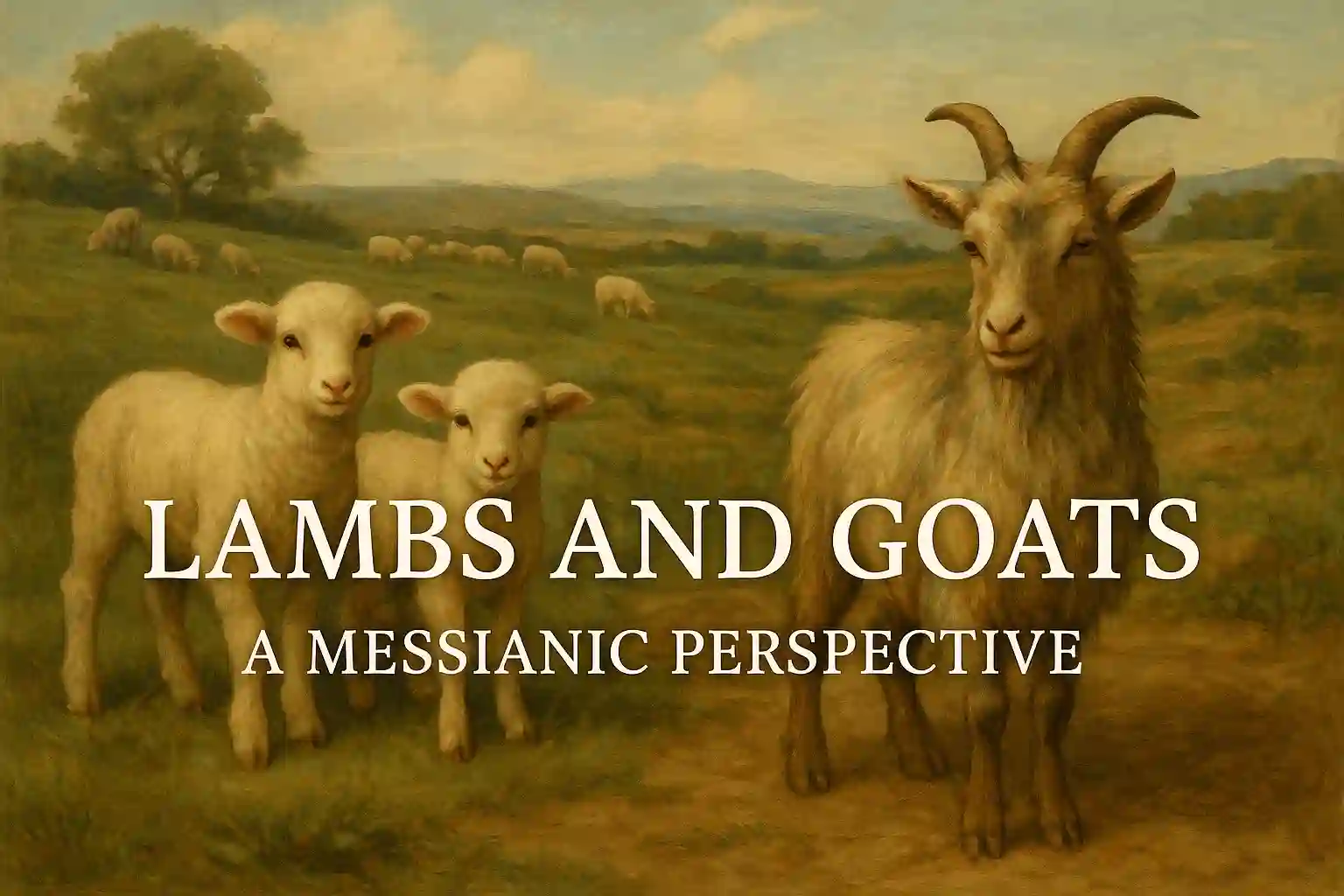A Messianic Reflection on the Final Separation
Sheep and Goats
Introduction
In Yeshua’s parable of the sheep and the goats (Matthew 25:31-46), He delivers one of the most sobering teachings about the end of the age and the judgment to come. This imagery, drawn from the daily life of ancient shepherds, is not simply pastoral poetry—it reveals a divine separation of humanity into two camps: those who follow the voice of the Good Shepherd and those who do not. From a Messianic perspective, this parable speaks deeply to the heart of Torah obedience, compassion, and the fruit of our faith in the Messiah. Let us unpack this profound teaching using both the Hebrew Scriptures (Tanakh) and the New Testament (Brit Chadasha), drawing upon the most powerful biblical stories that support and illuminate its meaning.
The Context of the Parable
Yeshua says:
“When the Son of Man comes in His glory, and all the holy angels with Him, then He will sit on the throne of His glory. All the nations will be gathered before Him, and He will separate them one from another, as a shepherd divides his sheep from the goats.” — Matthew 25:31-32
This passage occurs just before Yeshua’s crucifixion and is part of His final public teachings. Here, He prophesies about His return in glory—this is the Messianic King, not the suffering Servant of Isaiah 53, but the reigning Son of David who comes to judge the nations (cf. Zechariah 14:5-9).
Sheep and Goats: Symbols in Scripture
Sheep in Scripture often symbolize the faithful remnant of Israel:
“Know that the LORD, He is God; it is He who has made us, and not we ourselves; we are His people and the sheep of His pasture.” — Psalm 100:3
Goats, by contrast, are more independent and are sometimes associated with sin and rebellion:
“Then Aaron shall cast lots for the two goats: one lot for the LORD and the other lot for the scapegoat.” — Leviticus 16:8
One goat was for the LORD (a sin offering), and the other bore the iniquities of the people—a powerful foreshadowing of judgment and mercy.
The Voice of the Shepherd
In John 10, Yeshua identifies Himself as the Good Shepherd who lays down His life for the sheep:
“My sheep hear My voice, and I know them, and they follow Me.” — John 10:27
To be a sheep is to be in relationship with Yeshua, hearing and obeying His voice. This ties directly to Torah, where the command to “hear” (Shema) is central (Deuteronomy 6:4). The goats, then, are those who do not recognize the Shepherd’s voice—they may claim to know God, but they do not follow His ways.
The Fruit of Faith: Torah in Action
Yeshua commends the sheep for their actions:
“For I was hungry and you gave Me food; I was thirsty and you gave Me drink; I was a stranger and you took Me in…” — Matthew 25:35
These are Torah values—caring for the widow, the orphan, the poor, and the stranger (see Deuteronomy 10:18-19, Isaiah 58:6-10). The sheep lived out the commandments with love and justice. The goats failed in this regard—not out of ignorance, but out of a heart disconnected from the Messiah.
James (Yaakov), the brother of Yeshua, reinforces this:
“What does it profit, my brethren, if someone says he has faith but does not have works? Can faith save him?” — James 2:14
The sheep show their faith by what they do. The goats may have confessed belief but lacked the accompanying action.
Biblical Examples of Sheep and Goats
- Cain and Abel (Genesis 4)
- Abel brought a pleasing offering from his flocks (sheep), while Cain’s offering lacked heart and obedience. Abel walked in righteousness—Cain in self-will. Like sheep and goats, one is accepted, the other rejected.
- Abraham and Lot (Genesis 13)
- Abraham acted as a shepherd, trusting God’s promises. Lot, driven by his eyes and desire for prosperity, chose the wicked plains of Sodom. Their paths reflect spiritual priorities—Abraham’s faith and obedience (sheep) versus Lot’s compromise (goat).
- David and Saul
- David, the shepherd king, listened to God’s heart. Saul, though anointed, rebelled and trusted in his own understanding. David’s humility marks him as a sheep. Saul’s pride and disobedience mark him as a goat.
- The Pharisee and the Tax Collector (Luke 18:9-14)
- The Pharisee prays with pride, boasting of his works. The tax collector, humbled and repentant, cries for mercy. The humble man aligns with the sheep; the self-righteous with the goats.
- The Rich Man and Lazarus (Luke 16:19-31)
- The rich man lived in luxury but ignored the suffering at his gate. Lazarus, though poor, found comfort in Abraham’s bosom. Again, compassion (or lack thereof) reveals the heart’s position.
The Judgment of Nations
In Matthew 25, Yeshua speaks of separating not just individuals, but nations. This echoes Joel 3:2:
“I will gather all nations and bring them down to the Valley of Jehoshaphat; and I will enter into judgment with them there on account of My people, My heritage Israel.”
Nations that bless Israel, uphold justice, and walk in righteousness will be honored. Those who persecute, reject the ways of God, or remain indifferent to suffering will be condemned.
Messiah’s Call to Return
The message is urgent: return to the Shepherd of our souls. In Ezekiel 34, God rebukes the false shepherds of Israel but promises to personally seek out His sheep:
“I will seek what was lost and bring back what was driven away, bind up the broken and strengthen what was sick.” — Ezekiel 34:16
Yeshua fulfills this promise as the Good Shepherd, calling both Jew and Gentile to follow Him—not in mere words, but in faithful obedience, rooted in Torah and blossoming in love.
Conclusion: Who Are You Becoming?
This parable is not about earning salvation through deeds, but about revealing the genuine fruit of salvation. The sheep are not saved because they do good works—they do good works because they know the Shepherd. The goats are not condemned for ignorance but for a willful disregard of righteousness.
In the end, the question is not simply, “What do you believe?” but “Who do you follow?”
Messiah Yeshua is separating the flock.
“He who has ears to hear, let him hear.” — Matthew 11:15
May we each seek to walk as sheep—humbly, obediently, and full of compassion, ready for the Day when the King says:
“Come, you blessed of My Father, inherit the kingdom prepared for you from the foundation of the world.” — Matthew 25:34
Deeper Study
Shalom and blessings in the name of The Master Yeshua Messiah.
Discover more from Master Yahshua Messiah
Subscribe to get the latest posts sent to your email.

